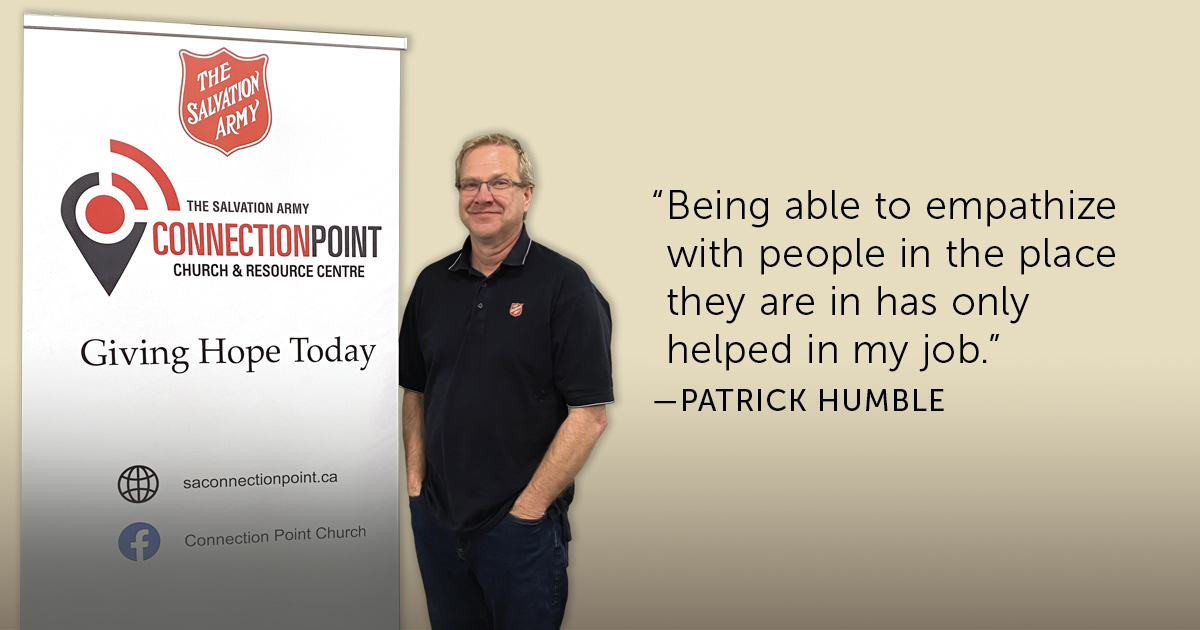As the newly minted director at The Salvation Army’s Victoria community and family services in British Columbia, Patrick Humble had just settled into his office and was going through his predecessor’s case files when he came across a folder that stopped him in his tracks.
“You don’t often see my last name,” says Patrick, “and when you do, it’s because we’re related. But this was my family. I was in that folder! How could that be?”
Welcome Help
Growing up, Patrick was a third-generation member of The Salvation Army. Though his family was not well off, summers were spent at Salvation Army camps, “and we still had a tree bursting with gifts every Christmas,” Patrick recalls.
The youngster never questioned how his parents were able to afford it.
“My brother and I just thought they said no all the time so that they could save up and help us where it mattered,” says Patrick.
As Patrick discovered while going through the old Salvation Army case files, “unbeknownst to me, The Salvation Army was helping my family out because we were barely making ends meet.”
“I was embarrassed, I was confused, I was a little angry. What is going on? How could I not know this?” PATRICK HUMBLE
Later, when he was in his teens, Patrick found himself on his own after his brother moved out of the apartment they were sharing and the landlord was forced to evict him as he was under age.
The Salvation Army stepped into Patrick’s life yet again. A friend who worked for the Army helped him find an affordable place to live, and more.
“He got me a better job than the one I had,” says Patrick. “And got me some clothes, provided food for my cupboard, furniture—everything I needed to start on my own. That was huge to me.”
A Different Point of View
In 1997, Patrick started working for the Army at a local shelter. He moved on from there to legal aid, then progressed to client services and pastoral care, which led to other roles around the building.
Returning from a hiatus, he applied for a management position and was accepted. After a few years, he was hired on as director. It was on his first day that Patrick saw the folder.
As he pored over the old files and records, he saw his life in an entirely new and disorienting light.
Confidentiality Rules
“I was embarrassed, I was confused, I was a little angry,” confesses Patrick. “What is going on? How could I not know this?”
As it happened, the office supervisor was the same person who had helped the younger Patrick to get on his feet with a new apartment and job. The two had known one another for more than 30 years.
“I went to him and slammed this folder down on his desk,” Patrick says now, a little sheepishly.
“What’s this all about? Why didn’t you ever tell me this?”
Patrick’s friend calmly looked at him and answered simply: “The rules of confidentiality. It was none of your business.”
“Why did he have to be so good at his job?” laughs Patrick now.
Wounded Healers
That chance discovery was career-altering for Patrick.
“Sometimes you have a client who you’re trying to help and they’re lost, defeated and feeling like there is no help, no one to help them and no one to understand what they are going through,” he says.
“You don’t understand,” they often tell him.
“I kind of do,” Patrick replies. “My name’s in the file drawer, too. Let’s work together and help you.”
Patrick occasionally lets a client sit in his office chair while he sits on the other side of the table.
“At any moment, the tables can be turned,” he explains. “That was a humbling thing to realize.
“It’s important to be able to share as much as possible with clients—not the full details, but just enough to let them know that we’re not this big, pompous group who are here to save you because you’re in trouble. We’re all wounded healers, and we all have a responsibility to each other. We’re a community. We weren’t meant to do it alone.
“And so having that background is interesting,” he continues. “Being able to empathize with people in the place they are in has only helped in my job. It’s helped me be a better leader, a better listener, a better person and a better Christian.
“It’s been an interesting journey!” concludes Patrick.
Patrick Humble is the community services director of The Salvation Army Connection Point and Resource Centre in Langford, B.C., in Greater Victoria.
This story is from:










What struck me was Pats comment about sitting on the other side of the table. A place we all could be but for the grace of our God. I’m fairly new to Connection Point Church. I feel so loved and excepted by everyone. Pat is so easy to talk to. I see him sitting in the hallway at times just to ask a person how they are , what can he do. And of course serving them coffee ,tea or whatever they need. Humble, caring, generous are just a few words to describe his love and caring of all who come in. God bless you Pat today and all the days of your life for HIS glorious service.